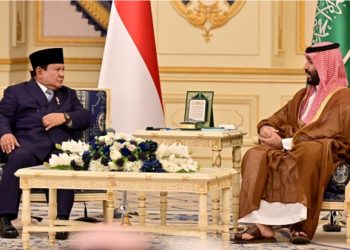Jakarta, Indonesia Sentinel — Indonesia aims to attract IDR 1.905 trillion (approximately $120 billion) in investments for 2025, marking a 15.6% increase from the previous year’s target of IDR 1.625 trillion. Minister of Investment and Downstream Industry, Rosan Roeslani, stated that both foreign direct investment (FDI) and domestic investment (DI) would contribute almost equally to achieving this goal.
“The proportion of FDI and DI will be nearly the same. Our projection suggests that FDI will account for slightly more than 51%, while DI will be around 48-49%,” Rosan said in an interview with CNBC Indonesia on Saturday, February 8, 2025.
Investment as a Key Driver for Economic Growth
President Prabowo Subianto has set an ambitious target of 8% economic growth, and investment plays a crucial role in achieving this. According to Rosan, domestic consumption remains the primary driver, contributing about 53-54% to the country’s GDP, followed by investments, which currently account for 24-25%.
To boost investment, the government is focusing on both short-term and long-term strategies. A major challenge has been bureaucratic inefficiencies, particularly in the licensing process. The government plans to improve the investment climate by streamlining permits, ensuring regulatory transparency, and enhancing predictability for investors.
“We need to make the licensing process faster, more structured, and transparent. This will provide certainty to investors and encourage more capital inflows,” Rosan explained.
Unlocking Indonesia’s Renewable Energy Potential
Indonesia holds vast investment opportunities, particularly in renewable energy and natural resources. However, despite having an estimated renewable energy potential of 3,700 gigawatts, the country has only installed 13.1 gigawatts—less than 1% of its total capacity.
“There is a huge gap between our renewable energy potential and actual implementation. Addressing this gap is essential to attract investors and transition toward sustainable energy sources,” Rosan emphasized.
Beyond renewable energy, Indonesia also offers significant opportunities in infrastructure, manufacturing, and downstream industries. The government’s focus is on translating these opportunities into tangible projects that generate economic growth and high-quality jobs.
Read Also:
Indonesia Uncovers $85 Million in Illegal Cryptocurrency Transactions Throughout 2024
Strengthening Indonesia’s Investment Appeal
To enhance its competitiveness, Indonesia is implementing policies to improve ease of doing business, provide investment incentives, and ensure regulatory stability. Rosan highlighted that investor confidence hinges on clear policies and efficient execution.
“We have abundant resources, but the key challenge is how to turn these resources into viable projects that positively impact the economy and employment,” he added.
With its strategic economic policies and commitment to reform, Indonesia is positioning itself as a top investment destination in Southeast Asia. However, the success of this ambitious investment target will depend on how effectively the government can address regulatory bottlenecks and enhance investor confidence.
(Becky)

























